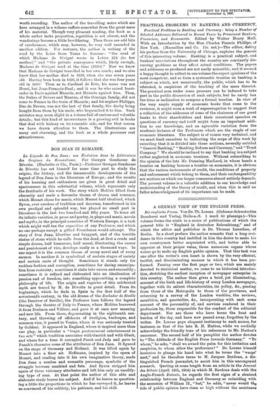PRACTICAL PROBLEMS IN BANKING AND CURRENCY.
Practical Problems in Banking and Currency : being a Number of Selected Addresses Delivered in Recent Years by Prominent BanIers, Financiers, and Economists. Edited • by Walter Henry Hull. With an Introduction by the Hon. Charles Francis Phillips, of New York. (Macmillan and Co. 15s. net.)—The editor, dating his preface from the University of Chicago, explains the genesis of this interesting volume. Banking is a practical subject, and bankers' associations throughout the country are constantly dis- cussing problems as they affect actual conditions. The papers and addresses so produced are not easily accessible, and it seemed a happy thought to collect in one volume the expert opinions of the most competent, and so form a systematic treatise on banking, b. subject on which, not unnaturally, the public, which has to be educated, is suspicious of the teaching of the mere theorist. The practical man under some pressure can be induced to take part in the public discussion of such subjects, but he rarely has the time or inclination to compose a formal treatise. In view of the very ample supply of economic books that come to the reviewer, it might seem a work of supererogation to suggest that a collection of the addresses of some of the chairmen of our groat banks to their shareholders and their occasional speeches on questions of currency and tariff might form an important addi- tion to our knowledge, and an agreeable variation from the academic lectures of the Professors which are the staple of our economic literature. The subject is of course very technical, and we must limit ourselves to indicating the scope of this work by recording that it is divided into three sections, severally entitled "General Banking," "Banking Reform and Currency," and "Trust Company." We should be inclined to say that banking is a subject rather neglected in economic treatises. Without subscribing to the opinion of the late Mr. Dunning MacLeod, in whose hands a treatise on banking became a treatise on economics, it is obvious that the various instruments of credit, the conditions of property and enforcement which belong to them, and their exchangeability are matters on which our larger commerce almost entirely depends. The present volume is a valuable addition to our knowledge and understanding of the theory of credit, and when this is said no fuller acknowledgment of its importance can be made.






























































 Previous page
Previous page